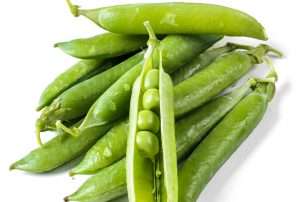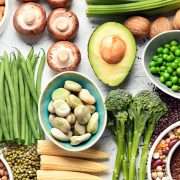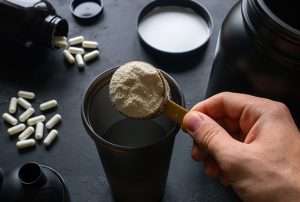Pea Protein – Review, Benefits and Side-Effects
What Is Pea Protein? Its Benefits and Side-Effects

Pea protein is a complete source of plant protein that has all the nine essential amino acids that your body can’t create on its own and must get from food. However, it is found to be low in methionine and cysteine.
It is one of the more easily digested plant-based proteins.
Pea protein is a great source of iron that is known to help in muscle growth, weight loss and improving heart health.
Nutritional Profile of Pea Protein

Pea protein powder is made by extracting protein from yellow peas. It is also known as Pea Protein isolate.
Even though nutritional facts can vary from brand to brand, two scoops (20 grams) roughly contains
- Iron: 5 mg
- Sodium: 230 mg
- Protein: 15 grams
- Carbs: 1 gram
- Fiber: 1 gram
- Calories: 80
- Total fat: 1.5 grams
Some of the key nutritional benefits of pea protein isolate are summarized below
1. High-Quality Source of Protein

Pea Protein is a good source of protein that consists of all the nine essential amino acids. But also has low levels of methionine in it.
This can be compensated by foods which are rich in methionine like brown rice.
Plus, it is also a great source of arginine, leucine, isoleucine and valine, which are known as the branched-chain amino acids (BCAAs) that are especially useful in promoting muscle growth.
2. Rich Source of Iron

Since most of the women in India are Anaemic, consuming pea protein supplements regularly can be a great way to boost iron intake.
Iron found in plant foods is less absorbable than what is found in animal products.
But this can be improved by consuming pea protein powder with anything citrus or Vitamin-C rich food items that can easily increase the absorption rate by up to 67%.
Most products contain around 28-42% of the reference daily intake (RDI) of iron for premenopausal women and 62-94% for men.
3. Goes With Any Kind of Diet

Pea Protein blends really well with water and has a less chalky texture compared to hemp protein.
A lot of people are allergic to lactose, casein, or other compounds in milk. Peas are unlikely to cause any kind of digestive discomfort as it does not contain any of the top eight allergens like wheat, soy, peanuts, tree nuts, fish, shellfish, eggs or cow’s milk.
It is a natural plant-based source and therefore is also gluten-free and dairy free.
Pea protein has numerous health benefits too. Here are some to quote a few:
1. Builds Muscle Mass

Whey protein is the most common protein for building muscles, and it’s considered high quality mostly because it’s high in branched chain amino acids. Pea protein is also high in these amino acids.
When paired with resistance training, pea protein can help build muscles more efficiently. It is just as effective as whey protein.
However, simply adding more protein in your diet will hardly have an effect on your muscles. It has to be continued with consistent exercise.
2. Keeps You Satiated

Protein keeps people feel fuller for longer as compared to carbs or fats since it’s used for building more muscles.
This results in overall reduced calorie intake and leads to weight loss in the long run.
Pea protein isolate is a good option for increasing daily protein intake and giving a sense of fullness after meals.
3. Benefits Heart

Pea Protein is low in saturated fat and therefore is a great source of lean protein.
Some animal studies have also found pea protein to reduce cholesterol levels. It primarily works by increasing the uptake of cholesterol into cells and reducing the body’s production of fats.
Further studies into the matter are required to see the effects of pea protein powder in lowering cholesterol levels.
Also Read: Top Benefits Of Using Collagen For Skin
4. Lowers blood pressure

As per a three-week study in humans, 3 grams of pea protein hydrolysate per day lowered systolic blood pressure the top number of a reading by 6 points.
Probable Side-effects of Pea Protein
Even though pea protein has fewer side effects and is generally tolerated well due to its process of extraction, the final pea protein that you get is relatively low in fiber.
And because of this refined version it does not cause gassiness or bloating like whole peas does for some people.
Another concern can be the pea protein powders are relatively high in sodium – containing approx 110-39- mg per serving.
Therefore, people with sodium-restricted diet should be cautious.
How much pea protein should you consume?

Pea protein is hypoallergic and a suitable fit for any kind of diet. It can be easily added to smoothies and shakes to increase one’s protein intake.
It is especially helpful for people trying to lose weight or building muscles.
1.6 grams per kg/ day is most effective for building muscles.
However, try not to exceed 5 grams per kg of body weight/ day or in other words get more than 35% of your calories from protein.
This is because, at extremely high doses, the liver may struggle to process protein fast enough that might lead to diarrhoea or nausea.
You can definitely go and have pea protein powder as a post-workout beverage or try PLIX plant protein powder that is a nutritious blend of pea protein and brown rice protein.
Other probable questions (FAQs)
Is pea protein good the skin?
Adding extra protein in your diet increases the amount of collagen in the body. This, in turn, makes the skin firm and healthy.
Does pea protein cause inflammation?
No, it does not. In fact, it is hypoallergic and is easier for the stomach to digest.
Does pea protein cause hormone dysfunction?
Only if you are allergic to legumes and grains. Otherwise, this is a great plant-based source of protein.
















